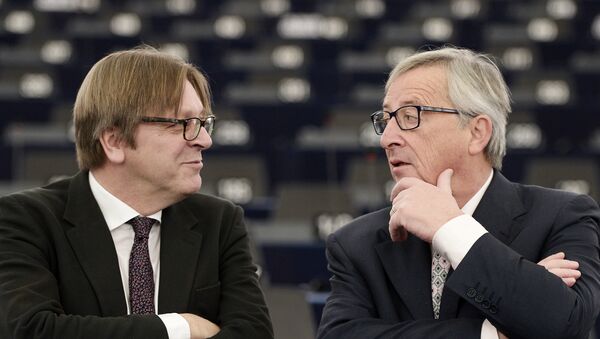The European Parliament has to decide how it will fit together following Brexit and who should sit in the 73 vacated British seats. Some MEPs, including Guy Verhofstadt, President of the pro-European group, Alliance of Liberals and Democrats for Europe (ALDE Group) and Brexit coordinator for the EP, believe Brexit provides a "historic opportunity" for parliament to introduce transnational lists to decide.
During a passionate speech filmed in the sparsely attended EP, Verhofstadt suggested federal states "wanted" transnational lists.
#TransnationalLists would be good for European democracy and here is why! See full video https://t.co/e4gao6y2uF #Eplenary #IamEuropean #FutureOfEurope #WeAreEurope 🇪🇺 pic.twitter.com/iO9N4jICo6
— Guy Verhofstadt (@guyverhofstadt) 7 February 2018
"Transnational lists are good for populists" is another argument I hear. Wrong," he said. "You can also say, democracy is only good for populists. So let's abolish democracy, let's abolish elections, nonsense. "I can tell you one that that's nonsense. You have to beat the populists, not to fear them. And that you have to do on transnational lists."
"Let's not waste this historic opportunity. Brexit will never come back. Altiero Spinell, the father of this European Parliament, would turn in his grave if we miss this unique opportunity," Verhofstadt said in a passionate speech to the EP.
Let’s not waste this historic opportunity to create #TransnationalLists and let people choose the next Commission president. Altiero Spinelli, father of this Parliament, would turn in his grave if we missed this unique chance #Eplenary #IamEuropean 🇪🇺
— Guy Verhofstadt (@guyverhofstadt) February 7, 2018
The European Parliament (EP) voted to reject transnational lists, which would allow European citizens to directly vote for their preferred candidate in the EP, on Wednesday February 7.
On transnational lists, we've lost the battle today, but not the war! We'll keep on fighting for a real European democracy. Incredible that @EPPGroup voted against. Wilfried Martens was in favor, and Helmut Kohl strongly believed in European citizenship 👉 https://t.co/rpwo0IoZ4c
— Guy Verhofstadt (@guyverhofstadt) 7 February 2018
Instead, MEPs backed the Spitzenkandidat process, which is the process of linking EP elections by allowing each major political group in the EP to nominate their candidate for the role as European Commission President, before parliamentary elections take place.
We created the #Spitzenkandidat process, now we're fighting for it. The candidate of the winning political family must lead the @EU_Commission https://t.co/Vlc7clcoJL
— PES (@PES_PSE) February 6, 2018
Three hundred and sixty eight members voted against transnational lists, 274 voted in favour and 34 abstained. The European Parliament is led by the European People's Party (EPP) but Brexit means 73 seats currently taken up by Britain will be empty after the UK leaves the EU in March 2019.
The #Spitzenkandidat process awards the @EU_Commission presidency to the party winning the most seats in the @Europarl_EN. It is paramount to maintain that also in #EUelections2019 & so keep EUs credibility as well — although some MS don't seem to care about that.
— Stavros Papagianneas (@StPapagianneas) February 7, 2018
READ MORE: European Parliament Votes to Annul 46 of UKs 73 Seats After Brexit
French President Emmanuel Macron suggested these seats be allocated to Europe-wide constituencies instead of national ones. "France will continue to defend the idea in months and years to come because it would contribute to strengthening European democracy by creating debates on European challenges and not strictly national ones during EU elections," Emmanuel Macron said.
If neither Macron nor the German government support #Spitzenkandidaten process, EP elections 2019 might not be about who becomes next Commission president.
— EPElections2019 (@EPElections2019) February 7, 2018
READ MORE: 'Significant Moment' as UK Citizens Rights Case Referred to ECJ


